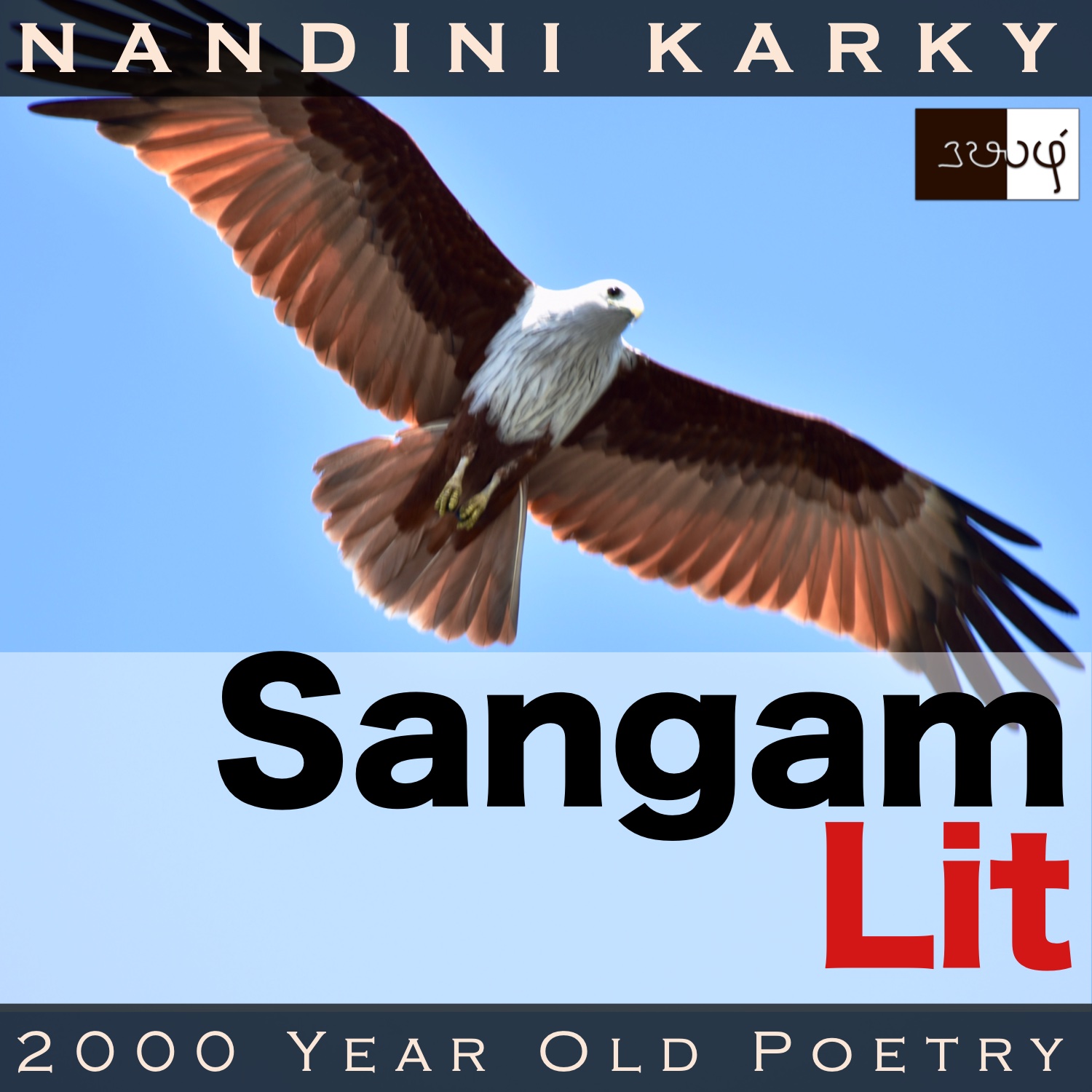Podcast: Play in new window | Download
Subscribe: Apple Podcasts | Spotify | Amazon Music | Android | iHeartRadio | TuneIn | RSS | More

In this episode, we listen to profound observations about wealth, as portrayed in Sangam Literary work, Kurunthogai 283, penned by Paalai Paadiya Perunkadunko. Set in the drylands of ‘Paalai’, the verse speaks in the voice of the lady to the confidante, in response to the friend’s worry that the lady would not be able to bear with the man’s parting.
உள்ளது சிதைப்போர் உளர் எனப்படாஅர்;
இல்லோர் வாழ்க்கை இரவினும் இளிவு எனச்
சொல்லிய வன்மை தெளியக் காட்டிச்
சென்றனர் வாழி-தோழி-என்றும்
கூற்றத்தன்ன கொலை வேல் மறவர்
ஆற்று இருந்து அல்கி, வழங்குநர்ச் செகுத்த
படு முடைப் பருந்து பார்த்திருக்கும்
நெடு மூதிடைய நீர் இல் ஆறே.
‘I suffer thinking not of me, but of him’ declares a voice in this verse. In the opening words ‘உள்ளது சிதைப்போர்’ meaning ‘those who destroy what is there’, a puzzle-like abstraction can be sensed. ‘இரவினும் இளிவு’ meaning ‘worse than begging’ reminds me of a contemporary Tamil phrase, spoken with disdain in real life, and also ironically, a staple of comedy scenes and memes, that goes ‘இதுக்கு பிச்சை எடுக்கலாம்’ meaning ‘you can rather beg than do whatever it is you are doing’. This highlights how the act of begging has been looked down upon for millennia together in Tamil culture. Returning to the verse, from abstractions we see the portrait of a tribe in ‘கொலை வேல் மறவர்’ meaning ‘robbers wielding killer spears’. When we hear the phrase ‘படு முடைப் பருந்து பார்த்திருக்கும்’ meaning ‘a predatory bird lies in wait for the rotting flesh’, the first bird that would come to mind is a vulture. However, I learnt today that it’s not just vultures, but even other birds like kites, falcons and eagles that indulge in such feeding on decaying flesh. Ending with the words ‘நீர் இல் ஆறே’ meaning ‘a path devoid of water’, the verse welcomes us to listen with empathy.
Deep abstractions on one side and dangerous scenes on the other! The context reveals that the man and lady were leading a happy married life when the man parted away to gather wealth. As days passed by, the lady languished in the man’s absence. Observing the changes in her friend, the confidante starts to worry if the lady can bear with the man’s parting any longer. To the confidante, the lady says, “‘Those who live by wasting what’s there are not considered to have. Such a life of not having is more disgraceful that begging’. Saying these words with conviction, he rendered clarity unto me and left. May he live long, my friend! Like eternal Death, with murderous spears, robbers lay in wait on the path to end lives of unsuspecting wayfarers, and vultures soar anticipating the carrion of those corpses in that waterless long path, traversed from ancient times!” With these words, the lady conveys to the confidante that she feels angst not on account of the man leaving her but about the dangers that await him in the journey.
An immersive dive within is needed to fully fathom this verse. The lady starts her words by talking about those who live by spending what’s there and declares that they are not considered to have. This is no loss in translation for that’s the tone the lady actually says without mentioning any of the elements directly. When reflecting upon that, it becomes clear that she’s talking about wealth left as an inheritance. If a person decides to live a life just out of what his parents have left him, such a person would not be considered as one possessing wealth, the lady implies. She further continues by adding that such a life of living from the wealth left behind is worse than begging. It’s at this point she makes it clear to us that she’s speaking not in her own words but those of her man. He seems to have said these words as justification for parting with her and her stance indicates that she has accepted the truth of it. While that may be the case, when her mind goes to that dangerous path he traverses, where like Death, bandits await with spears to finish the lives of wayfarers, for whose corpses scavenger birds seem to be waiting too, she is unable to bear it any longer, she says. Such is that arid, ancient path the man walks on, the lady sighs.
Now, it becomes clear that the lady is convinced about the man’s need to part away. In many verses, this understanding is missing on the part of the lady. She laments what’s the point of going in search of fading wealth and chides the man for leaving her in suffering. Here, it’s different in that the lady understands the logic in the man’s leaving. He couldn’t say no; he had to go, because that’s what honourable men in their society do, she consoles herself so! All that clearheaded logic is fine, but what can I do about my heart that throbs thinking of the dangers, lying in wait, spear in hand, flying up above, ready to pounce, the lady asks her friend. A question that I have asked in many Sangam verses seems to find an answer here. When the man was so wealthy, why did he have to leave the lady to go earn more wealth, I have wondered. This verse tells us that was not wealth at all in their eyes. What one earns by one’s own effort is the true determinant of one’s worth in this world seems to have been the strong belief of ancient Tamils. In that, shines like a beacon across centuries, the laudable virtue of self-reliance!




Share your thoughts...